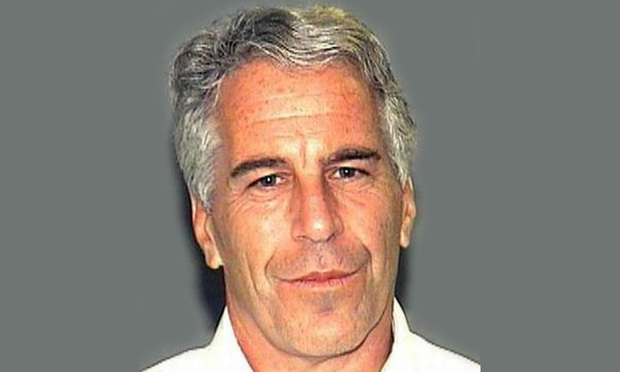Jeffrey Epstein's Shrouded Business Network Emerging in New Lawsuits Against His Estate
The new details come after sources told the New York Law Journal last week that Epstein, before he died, had tried to set up a fund to help cover the legal costs of certain employees and other associates who might be contacted by law enforcement.
August 20, 2019 at 12:55 PM
5 minute read
 Jeffrey Epstein/2011 police mug shot
Jeffrey Epstein/2011 police mug shot
A series of new lawsuits from Jeffrey Epstein’s accusers, filed overnight against the disgraced financier’s estate, laid out fresh allegations of abuse, and shed new light on how Epstein used his network of businesses to operate an alleged child-sex trafficking ring that landed him under federal indictment before his death earlier this month.
According to the filings, Epstein and those close to him used a network of eight companies to operate an “enterprise” that yielded vast power, wealth and resources to threaten and cajole the women and young girls he brought into his orbit.
The companies, which were registered in New York, Delaware and the U.S. Virgin Islands, for years enabled Epstein to procure commercial sex acts and expand the circle of young victims upon whom he allegedly preyed, according to the lawsuits.
One company acted as a front for further sexual abuse while Epstein participated in a work-release program after pleading guilty to two state prostitution charges in Palm Beach County, Florida, the lawsuits said.
Another, formed in New York following Epstein’s 2008 conviction in Florida, designated employees to recruit victims and keep them in line, the suits claimed.
“Epstein, his associates and related companies, including corporate defendants, through acts of fraud and coercion, caused plaintiff to engage in commercial sex acts for many years,” attorney J. Stanley Pottinger wrote on behalf of one of the plaintiffs, identified in the filing by the pseudonym Katlyn Doe.
The new details came in the three latest suits to target Epstein’s estate following his death Aug. 10 while awaiting trial on federal conspiracy and sex trafficking charges. Epstein’s death, which was ruled a suicide by hanging, ended the federal criminal case against him, but an investigation into his associates and other affairs remains ongoing.
A number of Epstein’s former employees have retained criminal defense attorneys.
Sources told the New York Law Journal last week that, before he died, Epstein had tried to set up a fund to help cover the legal costs of certain employees and other associates, who might be contacted by law enforcement in an ongoing criminal investigation into the alleged ring and Epstein’s affairs.
The suits claim that Epstein’s pattern of engaging women and girls for massages that turned sexual spanned “many years before” and “many years after” the 2002 to 2005 timeframe outlined in the government’s indictment. They allege that Epstein forcibly used a sex toy on one of the victims and confiscated the passport of another so that she could not leave his Caribbean island.
In the case of Katlyn Doe, one filing claimed Epstein had long promised to help treat the alleged victim’s eating disorder, and held out funding for surgeries as a way to allegedly manipulate the woman, who was 17 when she met Epstein.
Business Links
In addition to new allegations of sexual abuse, the lawsuits also detailed how Epstein used his shrouded network of businesses to find new victims and avoid detection by law enforcement.
According to the filings, Epstein continued to solicit sexual encounters while employed by the Florida Science Foundation Inc. during his participation in a work-release program in Florida. State records list the company’s headquarters in West Palm Beach, and Darren Indyke, Epstein’s longtime corporate attorney, as its director.
Indyke, who is also a joint representative of Epstein’s estate, has hired criminal defense counsel in New York, as a federal criminal investigation remains ongoing.
According to the lawsuit, Epstein engaged in paid sexual encounters while working out of his office at Florida Science, and leveraged his other businesses and associates to lure Katlyn Doe there in the hope of gaining legitimate employment with the company.
One of Epstein’s New York firms, HBRK Associates Inc., employed “numerous individuals whose primary, if not exclusive, objective” was to aid Epstein in his sex trafficking endeavor, the suits said.
According to the filings, employees of HBRK included recruiters and schedulers, who were responsible for maintaining appointments with young girls, some of whom were kept “on call.” Other employees, meanwhile, were allegedly responsible for providing gifts, money and services to alleged victims who met Epstein’s sexual demands.
The filings also alleged that NES, a limited-liability company, was tasked with maintaining Epstein’s daily massage schedule, while JEGE Inc., a Delaware corporation, owned at least one of Epstein’s planes, which was allegedly used to fly women and girls across state lines.
“Under Epstein’s control were numerous companies with many employees and obvious resources, each of whom worked for the Epstein enterprise,” Pottinger wrote. “While the individuals were employees of various Epstein-related companies, including defendant corporations, it was clear through explicit words and appearances that all such employees acted at Epstein’s direction and for his protection.”
The newest filings bring to at least five the number of lawsuits filed against Epstein’s estate following his death.
Geoffrey Berman, the Manhattan U.S. attorney, has said that Epstein’s death presented “yet another hurdle” to obtaining justice for the victims, but he confirmed that his office was continuing its probe of people linked to the financier.
U.S. Attorney General William Barr said last week that the criminal case would proceed against anyone who might have enabled Epstein’s behavior, and warned that any co-conspirators would be in the DOJ’s crosshairs.
“Let me assure you that this case will continue on against anyone who was complicit with Epstein,” he said in remarks last week. “Any co-conspirators should not rest easy. The victims deserve justice, and we will ensure they get it.”
Related story:
Ex-Lawyer to Jeffrey Epstein’s Business and Others Hire Counsel Amid Ongoing Criminal Probe
This content has been archived. It is available through our partners, LexisNexis® and Bloomberg Law.
To view this content, please continue to their sites.
Not a Lexis Subscriber?
Subscribe Now
Not a Bloomberg Law Subscriber?
Subscribe Now
NOT FOR REPRINT
© 2025 ALM Global, LLC, All Rights Reserved. Request academic re-use from www.copyright.com. All other uses, submit a request to [email protected]. For more information visit Asset & Logo Licensing.
You Might Like
View All

Family Law Practitioners Weigh In on Court System's New Joint Divorce Program

Former NY City Hall Official Tied to Adams Corruption Probe to Plead Guilty

New Charges Expected in Sex Trafficking Case Against Broker Brothers
Trending Stories
Who Got The Work
J. Brugh Lower of Gibbons has entered an appearance for industrial equipment supplier Devco Corporation in a pending trademark infringement lawsuit. The suit, accusing the defendant of selling knock-off Graco products, was filed Dec. 18 in New Jersey District Court by Rivkin Radler on behalf of Graco Inc. and Graco Minnesota. The case, assigned to U.S. District Judge Zahid N. Quraishi, is 3:24-cv-11294, Graco Inc. et al v. Devco Corporation.
Who Got The Work
Rebecca Maller-Stein and Kent A. Yalowitz of Arnold & Porter Kaye Scholer have entered their appearances for Hanaco Venture Capital and its executives, Lior Prosor and David Frankel, in a pending securities lawsuit. The action, filed on Dec. 24 in New York Southern District Court by Zell, Aron & Co. on behalf of Goldeneye Advisors, accuses the defendants of negligently and fraudulently managing the plaintiff's $1 million investment. The case, assigned to U.S. District Judge Vernon S. Broderick, is 1:24-cv-09918, Goldeneye Advisors, LLC v. Hanaco Venture Capital, Ltd. et al.
Who Got The Work
Attorneys from A&O Shearman has stepped in as defense counsel for Toronto-Dominion Bank and other defendants in a pending securities class action. The suit, filed Dec. 11 in New York Southern District Court by Bleichmar Fonti & Auld, accuses the defendants of concealing the bank's 'pervasive' deficiencies in regards to its compliance with the Bank Secrecy Act and the quality of its anti-money laundering controls. The case, assigned to U.S. District Judge Arun Subramanian, is 1:24-cv-09445, Gonzalez v. The Toronto-Dominion Bank et al.
Who Got The Work
Crown Castle International, a Pennsylvania company providing shared communications infrastructure, has turned to Luke D. Wolf of Gordon Rees Scully Mansukhani to fend off a pending breach-of-contract lawsuit. The court action, filed Nov. 25 in Michigan Eastern District Court by Hooper Hathaway PC on behalf of The Town Residences LLC, accuses Crown Castle of failing to transfer approximately $30,000 in utility payments from T-Mobile in breach of a roof-top lease and assignment agreement. The case, assigned to U.S. District Judge Susan K. Declercq, is 2:24-cv-13131, The Town Residences LLC v. T-Mobile US, Inc. et al.
Who Got The Work
Wilfred P. Coronato and Daniel M. Schwartz of McCarter & English have stepped in as defense counsel to Electrolux Home Products Inc. in a pending product liability lawsuit. The court action, filed Nov. 26 in New York Eastern District Court by Poulos Lopiccolo PC and Nagel Rice LLP on behalf of David Stern, alleges that the defendant's refrigerators’ drawers and shelving repeatedly break and fall apart within months after purchase. The case, assigned to U.S. District Judge Joan M. Azrack, is 2:24-cv-08204, Stern v. Electrolux Home Products, Inc.
Featured Firms
Law Offices of Gary Martin Hays & Associates, P.C.
(470) 294-1674
Law Offices of Mark E. Salomone
(857) 444-6468
Smith & Hassler
(713) 739-1250






